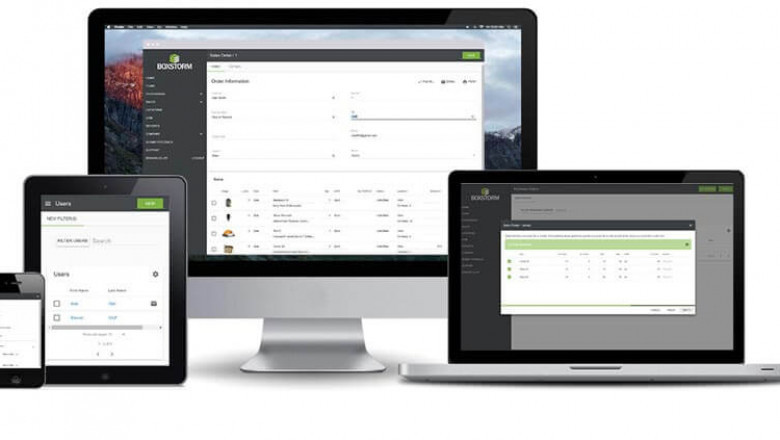views
Cloud-Based Inventory Management System
Cloud-based inventory management system is a modern solution that helps businesses track, control, and optimize their stock in real time. This technology streamlines operations, reduces errors, and improves overall productivity.
In this article, we'll explore:
- What a cloud-based inventory management system is
- How it works
- Its benefits
- Key features to look for
- Top industries that benefit from it
- How to choose the best system for your business
What Is a Cloud-Based Inventory Management System?
A cloud-based inventory management system is a digital platform that enables businesses to monitor and control their inventory using cloud technology. Unlike traditional on-premise solutions, cloud-based systems store data online, making it accessible from anywhere with an internet connection.
This system automates inventory tracking, sales, purchases, and stock movements in real-time, reducing manual errors and improving efficiency.
How Does a Cloud-Based Inventory Management System Work?
- Data Collection: The system records inventory-related data such as stock levels, sales, purchases, and returns.
- Cloud Storage: All data is securely stored in the cloud, eliminating the need for physical servers.
- Real-Time Updates: Changes in inventory are instantly updated across all connected devices and locations.
- Automation: The system can automate tasks such as stock replenishment, order processing, and notifications.
- Integration: It can integrate with accounting software, e-commerce platforms, and supply chain systems for seamless operations.
Key Benefits of a Cloud-Based Inventory Management System
1. Real-Time Inventory Tracking
Cloud-based systems update inventory levels instantly, allowing businesses to make informed decisions. This reduces stockouts and overstocking.
2. Accessibility from Anywhere
Since the data is stored online, users can access inventory reports and stock levels from any device, anywhere in the world. This is especially beneficial for businesses with multiple locations.
3. Cost Efficiency
Traditional inventory management systems require expensive hardware and maintenance. Cloud-based solutions are subscription-based, reducing upfront costs and IT maintenance expenses.
4. Automation Reduces Human Errors
By automating processes like stock tracking and order fulfillment, businesses can reduce human errors, saving time and money.
5. Scalability
Cloud-based inventory systems grow with your business. Whether you're a small business or a large enterprise, the system can be adjusted to meet your needs.
6. Improved Data Security
Cloud providers offer advanced security measures, including encryption and backups, ensuring your inventory data is safe from cyber threats.
7. Better Decision Making with Analytics
These systems provide detailed reports and analytics, helping businesses make data-driven decisions to optimize stock levels and sales strategies.
Key Features to Look for in a Cloud-Based Inventory Management System
If you're considering adopting a cloud-based inventory system, here are some essential features to look for:
1. Multi-Location Management
If your business operates in multiple locations, the system should allow you to track stock across all warehouses and stores.
2. Barcode & RFID Scanning
Integration with barcode or RFID scanners ensures quick and accurate inventory updates.
3. Demand Forecasting
Advanced systems use AI to predict future demand based on historical sales data, preventing overstocking or stockouts.
4. Integration with Other Systems
Choose a system that integrates seamlessly with accounting software, e-commerce platforms, and POS systems.
5. Mobile Access
A mobile-friendly interface allows managers to check inventory levels and reports on the go.
6. Automated Alerts & Notifications
The system should send alerts for low stock levels, expiring products, or unusual stock movements.
Industries That Benefit from Cloud-Based Inventory Management Systems
1. Retail
Retailers can track stock levels across stores and warehouses in real-time, preventing lost sales due to stockouts.
2. E-Commerce
Online businesses can integrate inventory management with their e-commerce platforms to ensure smooth order fulfillment.
3. Manufacturing
Manufacturers need accurate stock data to ensure they have the right materials for production. Cloud-based systems help optimize supply chain management.
4. Healthcare & Pharmaceuticals
Hospitals and pharmacies must track medical supplies accurately to avoid shortages and compliance issues.
5. Food & Beverage
Restaurants and food suppliers need to manage perishable goods efficiently to reduce waste.
How to Choose the Best Cloud-Based Inventory Management System
When selecting an inventory management system, consider these factors:
- Business Size & Needs: Choose a system that fits your business size and industry-specific requirements.
- Ease of Use: The platform should be user-friendly and require minimal training.
- Integration Options: Ensure it works with your existing tools like accounting software and e-commerce platforms.
- Scalability: The system should be able to grow with your business.
- Security Measures: Check for strong data encryption and backup options.
- Customer Support: Look for providers that offer 24/7 support and training.
Conclusion
A cloud-based inventory management system is a game-changer for businesses looking to optimize their stock control. With real-time tracking, automation, and seamless integration, it enhances efficiency, reduces costs, and improves decision-making. Whether you're a small retailer or a large manufacturer, adopting this technology can give your business a competitive edge.






















Comments
0 comment